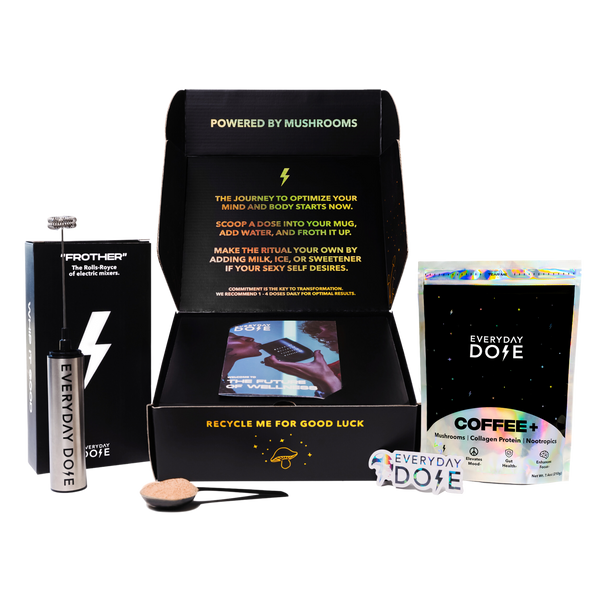Does Collagen Cause Constipation? A Side Effects Guide

Have you ever noticed your digestive system feeling a little slow after taking collagen? We know digestive movements aren’t a normal topic of conversation, but we’d like to challenge that stigma. The truth is, you can actually learn a lot from your bowel movements and digestive patterns.
For instance, some people feel constipated after taking collagen — but it doesn’t mean what you might think it means. Read on to learn more about collagen and constipation, as well as how you can avoid these digestive side effects.
What Is Collagen?
Collagen is often presented as the glue that holds your body together — and this is quite literal. As the most abundant protein in the body, collagen is the backbone for your skin, joints, muscles, connective tissues, and even your gut.
It holds all of these things together and helps them retain their shape, even after they’ve been bent. If you’ve ever watched your skin snap right back into place after you pinch it, you’ve seen collagen (and skin elasticity) in action.
But here’s the catch: Collagen production decreases as we age. This is why many people turn to collagen supplements to provide their bodies with plenty of extra collagen to support their joint and skin health.
There are a few key types of collagen you should know about:
- Type I: This type is found mainly in the skin.
- Type II: This type is found in cartilage to encourage smooth movement.
- Type III: This type helps with muscle mass and gut health.
Can Collagen Cause Constipation?
Here it is, — the question everyone’s too shy to ask. Can collagen cause constipation? For some people, yes — but it’s not the collagen itself that’s the problem.
Many collagen peptide products lack fiber, which can cause things to slow down in the digestive system. Also, if you're not drinking enough water, collagen may cause constipation by pulling moisture from your gut. The good news is that not everyone experiences digestive issues when taking collagen, and these issues are also pretty easy to avoid.
What Are the Other Side Effects of Collagen?
Collagen is generally well-tolerated, but let’s talk about the not-so-fun stuff. Some people could experience side effects like:
- Bloating or digestive problems
- Allergic reactions like rashes, particularly if you have sensitivities to shellfish (which can be present in marine collagen)
- Hypercalcemia (too much calcium) if you’re overloading on collagen dietary supplements.
- Kidney stones are rare, but a possibility if you take way too much collagen protein.
Most side effects of collagen are mild, and switching to a high-quality product can help reduce discomfort. As always, chat with a healthcare provider if you have concerns or start to notice any strange symptoms.
How Can You Prevent Side Effects From Collagen?
While the risk is low, these potential side effects are still not fun. Luckily, they can also be pretty easy to prevent (except for allergic reactions).
Here are some tips on how to avoid side effects of collagen:
- Stay Hydrated: Collagen absorbs water during digestion, so drinking plenty of fluids prevents constipation.
- Balance Your Diet: Pair collagen with fiber-rich foods to support the digestive system.
- Start With a Low Dose: Gradually increasing your collagen supplementation allows your body to adjust.
- Check the Ingredients: Avoid low-quality or heavily processed supplements, especially if they contain additives that may trigger allergic reactions.
- Consult a Healthcare Provider: If you have concerns about your collagen intake, a nutritionist or healthcare professional can help you make decisions based on your health profile.
Who Should Avoid Collagen?
While collagen supplements offer many health benefits, they may not be suitable for everyone. As we already mentioned, people with allergies to shellfish should avoid certain types of collagen to prevent allergic reactions. If you have any dietary restrictions around red meat, you should also make sure you’re careful about your sourcing of collagen. Many collagen supplements use animal sources like bovine.
Additionally, people with digestive issues like irritable bowel syndrome (IBS) may experience discomfort when starting a new supplement. If you have underlying gastrointestinal conditions, kidney disease, or other health concerns, consult a healthcare provider before incorporating collagen peptides into your routine.
How Can Collagen Support Gut Health?
When you hear the word “collagen,” you may think of skin care and joint health. However, collagen also plays a role in gut health by supporting the digestive system and encouraging a balanced gut environment.
Here are just a few potential benefits of collagen:
- Supports the Gut Lining: The amino acid hydroxyproline helps support the intestinal barrier, potentially easing symptoms like bloating or gastrointestinal discomfort.
- Aids Digestion: Collagen peptides contain glycine, which can support a proper acidity level in the stomach and encourage nutrient absorption.
- Promotes Hydration: Collagen attracts water, which can support skin hydration and digestive health.
- Supports the Gut Microbiome: Collagen’s amino acids may support a good balance of gut bacteria, which can then support overall digestive health.
How Can You Take Collagen for Smooth Digestion?
Incorporating collagen supplements into your routine is simple. For instance, collagen powder easily dissolves in smoothies, coffee, or water, which makes it super convenient. It’s also relatively flavorless.
You can also look for food sources that are high in natural collagen. For instance, bone broth, fish, and eggs are all rich in collagen. You may also want to eat more foods rich in vitamin C (like citrus fruits and bell peppers) because this vitamin is one of the main building blocks our bodies use to make collagen.
The recommended dosage varies, but most experts suggest 2.5 to 15 grams per day. You should look for high-quality, hydrolyzed collagen from trusted sources if you’re looking to really maximize the effects of collagen supplements.
Speaking of high quality, our Mushroom Coffee+ contains four grams of grass-fed bovine collagen per serving. As a bonus, you won’t have to worry about potential side effects — our blends are designed to be mixed with water, so you’ll have plenty of hydration. Also, our blends feature functional mushrooms, which are a great source of prebiotic fiber to support digestion.
That’s not all, though. Our mushroom coffee can support focus, memory-making, energy, relaxation, immunity, and high-quality sleep thanks to superstar ingredients like lion’s mane and chaga mushrooms, and L-theanine. Plus, we combine all of this with coffee extract so that you can enjoy the smooth, rich taste of your favorite brew (sans side effects).
The Bottom Line
If you’re someone who experiences constipation with collagen, we feel for you. However, this usually isn’t a result of the collagen itself — instead, constipation can show up when we take collagen without also taking fiber and staying hydrated.
We’re all about efficiency here at Everyday Dose, which is why our mushroom blends are designed to meet all three goals at once. Don’t believe us? Try a starter pack of our Bold Coffee+ today and see for yourself!
Sources:








